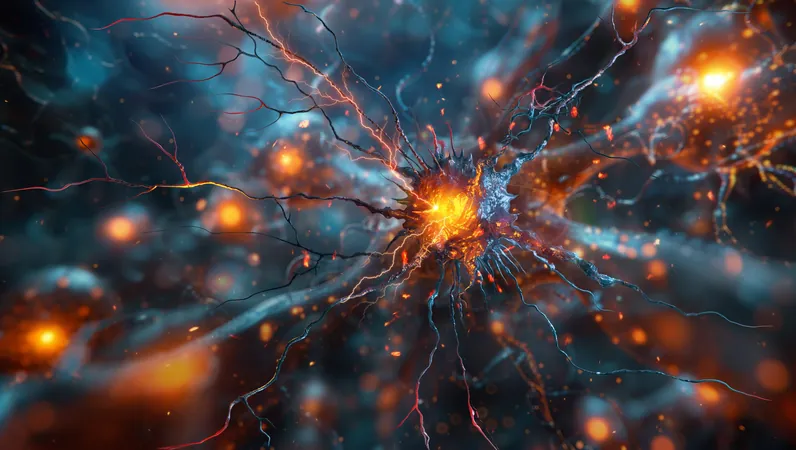
Revolutionary Lipid Nanoparticles Target Neurons: A Game Changer for Brain Disease Treatments!
2024-12-30
Author: Li
Revolutionary Lipid Nanoparticles Target Neurons: A Game Changer for Brain Disease Treatments!
Researchers at the University of Pennsylvania are making headlines with their groundbreaking advancements in lipid nanoparticles (LNPs), which now have the ability to not only breach the blood-brain barrier (BBB) but also accurately target neurons. This major development, detailed in the journal Nano Letters, could herald a new era for mRNA therapies aimed at treating debilitating neurological diseases, including Alzheimer’s and Parkinson’s.
For years, the medical community has sought effective methods to deliver mRNA directly to brain cells, as the blood-brain barrier has posed a significant challenge. This barrier acts as a fortress, preventing most foreign substances, including large molecules like mRNA, from infiltrating the brain. The Penn researchers have devised an innovative strategy utilizing peptides—short chains of amino acids—that serve as targeting agents. This allows the lipid nanoparticles to specifically deliver mRNA to the endothelial cells lining blood vessels in the brain and directly to neurons, unlocking the potential for customized treatments for neurodegenerative disorders.
A Leap in mRNA Delivery Techniques
Previous studies conducted by the team indicated the feasibility of LNPs crossing the BBB to deliver mRNA to the brain. However, questions remained about the precise localization of this mRNA once it reached its destination. "Our initial work demonstrated we could deliver mRNA to the brain, but we hadn’t pinpointed where that message was headed," explained Associate Professor Michael J. Mitchell, the senior author of the study. "With peptides acting as guideposts, we can now ensure these treatments reach exactly the right cells, akin to delivering a package to every house with a red mailbox."
This development has significant implications for developing therapies for complex neurological conditions that require specific targeting of various brain cell types.
Tackling the Blood-Brain Barrier Challenge
The ability to bypass the BBB without invasive procedures marks a pivotal step in pharmaceutical advancements. Emily Han, a doctoral student in Mitchell's lab, pointed out that traditional methods often require injections directly into the brain or spinal canal–procedures that carry high risks and complications. In contrast, LNPs, composed of lipid materials that mimic natural brain-penetrating substances, offer a non-invasive alternative.
Why Peptides Are the Future
Historically, most efforts to enhance organ targeting with nanoparticles relied on antibodies. However, this approach has limitations, making particles bulkier and less able to traverse the BBB. Peptides, being smaller and more versatile, can easily bind to LNPs without compromising their size or function. Additionally, their production is more cost-effective, and they produce fewer unintended immune reactions compared to antibodies.
The research team meticulously verified the incorporation of peptides onto the LNPs through optimized quantification techniques. After rigorous trials, they successfully demonstrated the targeted delivery of mRNA to both neurons and endothelial cells in brain models—an achievement that required overcoming significant biological complexities.
Looking to the Future
As the team looks ahead, the critical question remains: How much of the brain must be targeted with these peptide-functionalized LNPs (pLNPs) to effectively manage or potentially cure neurodegenerative diseases? "Are we looking at needing to target every neuron or just a small subset?" pondered Mitchell, emphasizing the need for precise delivery strategies.
Understanding the optimal levels of neuronal targeting is essential for advancing mRNA-based treatments for Alzheimer's, Parkinson's, and other neurological disorders, bringing us one step closer to translating this research into real-world therapies.
This pioneering study at the University of Pennsylvania is backed by prestigious organizations, including the US National Institutes of Health and the American Cancer Society, marking a hopeful trajectory toward innovative treatments for some of the most challenging health issues of our time. Get ready—mRNA therapy for brain diseases may soon become a reality!
 Brasil (PT)
Brasil (PT)
 Canada (EN)
Canada (EN)
 Chile (ES)
Chile (ES)
 Česko (CS)
Česko (CS)
 대한민국 (KO)
대한민국 (KO)
 España (ES)
España (ES)
 France (FR)
France (FR)
 Hong Kong (EN)
Hong Kong (EN)
 Italia (IT)
Italia (IT)
 日本 (JA)
日本 (JA)
 Magyarország (HU)
Magyarország (HU)
 Norge (NO)
Norge (NO)
 Polska (PL)
Polska (PL)
 Schweiz (DE)
Schweiz (DE)
 Singapore (EN)
Singapore (EN)
 Sverige (SV)
Sverige (SV)
 Suomi (FI)
Suomi (FI)
 Türkiye (TR)
Türkiye (TR)
 الإمارات العربية المتحدة (AR)
الإمارات العربية المتحدة (AR)